
60 years ago today, The Beatles appeared on The Ed Sullivan Show before a record-setting audience of Americans waiting to see them perform their No. 1 hit, I Want to Hold Your Hand. Never before had so many viewers tuned in to a live television program; with 73 million viewers, it totaled three-fourths of the total adult audience in the U.S. READ what happened next… (1964)
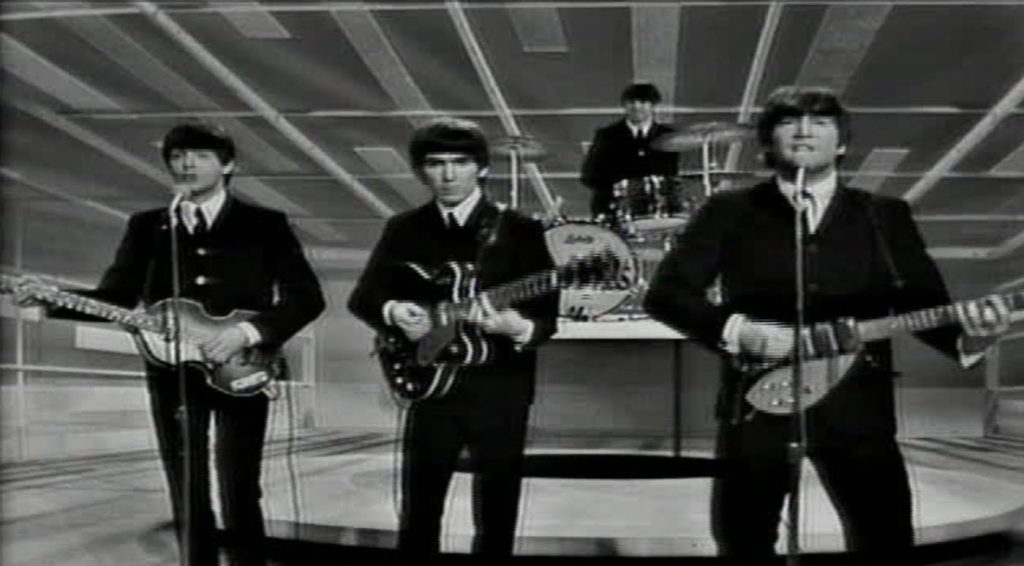
On October 31, Ed Sullivan was at London’s Heathrow Airport and saw a crowd of 1,500 fans await the Beatles’ return from a tour of Sweden. Struck by the crowds, Sullivan became interested in booking the Beatles for his show, and contacted Beatles manager Brian Epstein.
The Beatles flew into John F. Kennedy International Airport on February 7th to a waiting crowd of 5,000 fans, CBS saw huge anticipation for the Beatles’ first appearance, with 50,000 ticket requests for the 728-seat studio.
Sullivan then introduced the Beatles, who opened by performing All My Loving; Till There Was You, which featured the names of the group members superimposed on closeup shots, including the famous “SORRY GIRLS, HE’S MARRIED” caption on John Lennon.
The band recorded two more songs that night for other Sullivan broadcasts, Please Please Me and Twist and Shout, with the host introducing them—speaking warmly of “their conduct as fine youngsters”. (1964)
MORE Good News on this Date:
- Jamaica became independent (1962)
- George Harrison presented UNICEF with a check for $9 million, ten years after his fundraising began with in The Concert For Bangladesh (1982)
- Voters in Lithuania voted for independence (1991)
- The Vance-Owen peace plan for Bosnia and Herzegovina was announced (1994)
- Space Shuttle astronauts Bernard A. Harris, Jr. and Michael Foale became the first African-American and first Briton to perform spacewalks (1995)
101 years ago today, the great Irish playwright and author Brendan Behan was born in Dublin. Famous for the dark, gripping play The Quare Fellow, an outrageous drunken BBC interview with Malcolm Muggeridge, and an autobiographical novel that became a world-wide bestseller, Behan was named by the newspaper Irish Central as one of the greatest Irish writers. A volunteer in the Irish Republican Army, he did two separate prison sentences, one as a boy, and another as a man, which informed his writing and plays. He was also a faithful keeper of the Irish singing tradition and contributed the famous The Auld Triangle to the traditional repertoire.
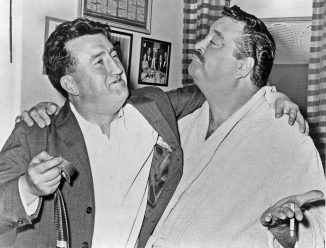
Behan’s first play was written based on the experience of 4 years in prison for conspiracy to commit murder. Entitled The Quare Fellow, it takes place in a death-row penitentiary and is most unique for its gallows humor, and the fact that the protagonist, referred to only as “the quare fellow,” is never seen nor heard, but only discussed by the inmates in the days leading up to his death sentence. Performed first at Shakespeare’s home in Stratford upon Avon, then on Broadway, it become hugely successful. Behan’s second play written in the Irish language, and entitled “The Hostage,” was adapted to English and performed in Paris, where it received rapturous success considering that “nine-tenths of the audience failed to understand or even to hear more than one-tenth of the action or the dialogue.”
His autobiographical novel, Borstal Boy, named for the correctional facility he was sent to as a teenager, became a world-wide bestseller, which generated a wave of fame that saw him spend more and more time in New York City; of which he loved, and wrote: “To America, my new found land: The man that hates you hates the human race.” It won a Tony Award for its later adaptation into a play. (1923)
WATCH his 5-minute interview on BBC, following the release of The Hostage
And, 26 years ago today, the first annual Random Acts of Kindness Week began. Originally, the idea to “practice random acts of kindness and senseless acts of beauty” came to Anne Herbert while sitting in a Sausalito café during the 1980s. 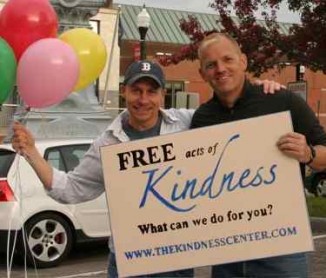
After writing the idea on a napkin, she wrote a 1991 book about it, for ages 7 and up. This year, the week-long campaign will run the second week of February, culminating in RAK Day on Feb. 17. (1998)
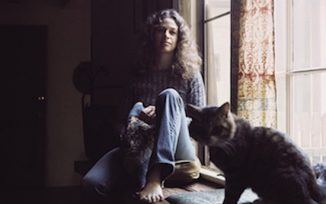
Also, Happy 82nd Birthday to singer–songwriter Carole King, whose life was portrayed on Broadway in The Carole King Musical. Carol Klein, a Brooklyn girl with passion and chutzpah, she wrangled her way into the record business as a teen and soon had the husband of her dreams and a flourishing career writing hits for the biggest acts in rock n roll. But when her personal life began to unravel, she found her true calling, singing her own songs, and she released one of the biggest-selling albums of all time, Tapestry. (1942)
And, 129 years ago today, the sport of volleyball was first introduced to the world. William Morgan invented the game after he met the inventor of basketball, James Naismith, who was teaching the game 10 miles up the road.
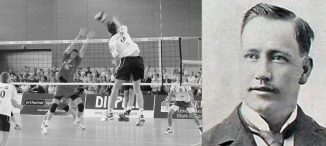 Morgan wanted a team sport more suitable for older members of his YMCA who were still athletic, but not able to keep up with running up and down the court. He asked A.G. Spalding to make him a lighter-sized leather ball for volleying back and forth over a 6-foot 6-inch net. Thus, the game that was loosely based on badminton was first played in a YMCA gymnasium in Holyoke, Massachusetts. The 1964 Summer Games in Tokyo was where volleyball was first unveiled as an Olympic sport. (1895)
Morgan wanted a team sport more suitable for older members of his YMCA who were still athletic, but not able to keep up with running up and down the court. He asked A.G. Spalding to make him a lighter-sized leather ball for volleying back and forth over a 6-foot 6-inch net. Thus, the game that was loosely based on badminton was first played in a YMCA gymnasium in Holyoke, Massachusetts. The 1964 Summer Games in Tokyo was where volleyball was first unveiled as an Olympic sport. (1895)
And, 53 years ago today, Satchel Paige became the first Negro League player to enter the Baseball Hall of Fame. The famed pitcher notable for his longevity—playing until age 47 and attracting record crowds wherever he played—earned a unanimous vote from all the men on the committee. They agreed that Paige must be the first Negro League player to be elected.
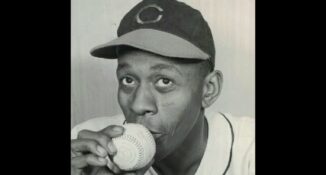
Leroy ‘Satchel’ Paige threw nothing but fastballs. He was called ‘the hardest thrower in the history of baseball’, but he also had impeccable precision and endurance, playing full games day after day. Joe DiMaggio said that Paige was the best he ever faced and Bob Feller said he was the best he ever saw.
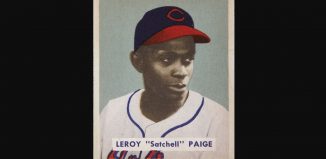
In 1948, at age 42, Paige made his major league debut for the Cleveland Indians as the first black pitcher to play in the American League, as well as the first one to pitch in and win a World Series. WATCH him play in this mini-biography… (1971)
He was the seventh black player overall to join Major League Baseball. He’s buried on Paige Island in the Forest Hill Memorial Park Cemetery in Kansas City.
SHARE the Memories, Milestones, and Music…